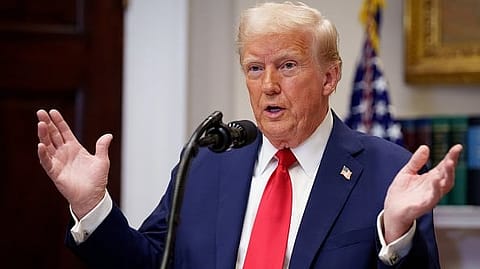Trump confirms August 1 tariffs, says no extensions to be granted
Trump has already warned of 10% additional tariffs on countries that align with BRICS, a bloc comprising 10 countries, including India

Dismissing any possibility of further delays, US President Donald Trump on Tuesday said the US government's “reciprocal” tariffs will come into effect on August 1, 2025, as scheduled.
"As per letters sent to various countries yesterday, in addition to letters that will be sent today, tomorrow, and for the next short period of time, TARIFFS WILL START BEING PAID ON AUGUST 1, 2025. There has been no change to this date, and there will be no change. In other words, all money will be due and payable starting AUGUST 1, 2025 - No extensions will be granted. Thank you for your attention to this matter!" he said.
Trump's comments have come after he announced a new wave of country-specific blanket tariffs ranging from 25% to 40% on imports from 14 nations, including Japan and South Korea. The move has reignited concerns about escalating trade tensions.
Trump on Monday warned of 10% additional tariffs on countries that align with BRICS, a bloc comprising ten countries – Brazil, Russia, India, China, South Africa, Egypt, Ethiopia, Indonesia, Iran, and the United Arab Emirates.
“Any Country aligning themselves with the Anti-American policies of BRICS, will be charged an ADDITIONAL 10% Tariff. There will be no exceptions to this policy. Thank you for your attention to this matter!” Trump wrote on his social media platform, Truth Social. The statement came after the leaders of BRICS countries met in Rio de Janeiro, Brazil, to voice “serious concerns” about the rise of unilateral tariff and non-tariff measures, which distort trade and are inconsistent with WTO (World Trade Organization) rules.
Trump has also signed an executive order determining that certain tariff rates, which were initially set to expire on July 9, will now expire on August 1, 2025. These actions were based on information on the status of trade negotiations with these countries.
Meanwhile, the world is eagerly waiting for the outcome onthe potential trade deal between India and US. On July 5, Piyush Goyal, the Union Minister of Commerce and Industry, said India will never strike a trade deal—ostensibly with the U.S.—“based on a timeline,” later reiterating that India negotiates from a position of strength.
Recommended Stories
Notably, on April 2, Trump introduced a sweeping set of tariffs under a “reciprocal tariff” framework, which included an additional 26% duty on Indian goods entering the U.S. However, a week later, on April 9, the U.S. administration granted a 90-day postponement for most of these tariffs, reverting temporarily to a flat 10% rate for nearly all impacted nations. Speculations are rife that India could soon sign a mini-deal with the US.